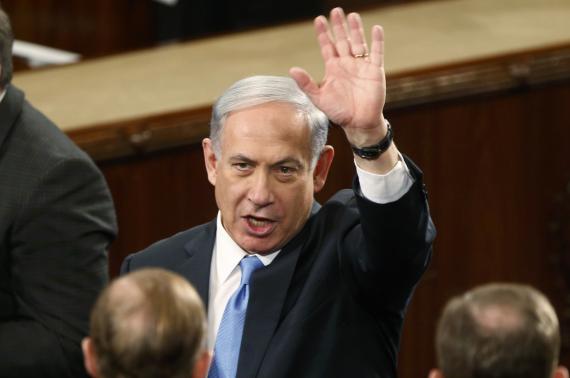[caption id="attachment_154132" align="alignright" width="185"] Israeli Prime Minister Benjamin Netanyahu waves prior to his address to a joint meeting of Congress in the House Chamber on Capitol Hill in Washington, March 3, 2015.
Israeli Prime Minister Benjamin Netanyahu waves prior to his address to a joint meeting of Congress in the House Chamber on Capitol Hill in Washington, March 3, 2015.
CREDIT: REUTERS/JONATHAN ERNST[/caption]
(Reuters) - Oil rebounded on Tuesday as Israeli Prime Minister Benjamin Netanyahu warned the Obama administration against accepting a weak nuclear deal with Iran, while rival Libyan forces targeted oil terminals in the African nation.
Higher prices imposed by Saudi Arabia on its crude buyers in Asia, the United States and northwest Europe was another positive development, traders said, although some had expected benchmark Brent and U.S. oil futures to rally even more on that.
U.S. crude futures were volatile on concerns that oil inventories in the United States had hit record highs. Industry group American Petroleum Group (API), however, indicated that last week's crude builds could be smaller than initially thought.
Oil got a strong start after rival Libyan forces carried out tit-for-tat air strikes on oil terminals and an airport, reviving fears over local crude supplies.
Gains accelerated just before noon in New York when Netanyahu told the U.S. Congress that the nuclear deal being negotiated by Washington and Tehran would almost guarantee nuclear weapons for OPEC member Iran.
"His speech may have reinforced the geopolitical tensions around Iran, though I don't believe this rebound has legs given the fundamental picture of oil oversupply," said Gene McGillian, senior analyst at Tradition Energy in Stamford, Connecticut.
Brent's front-month contract LCOc1 settled up $1.48, or 2.5 percent, at $61.02 a barrel. It tumbled nearly 5 percent on Monday, its biggest loss in a month, on speculation that a quick nuclear deal between Iran and the West could ramp up Tehran oil's exports, adding to global inventories.
U.S. crude's front-month CLc1 finished up 88 cents at $50.47 a barrel, after falling into negative territory earlier. In post-settlement trade, it got nearer to $51 after industry group API reported a build of just below 3 million barrels last week versus a Reuters poll calling for a 4-million-barrel rise. [EIA/S]
U.S. crude was choppy most of the day on worries of another large stockpile build last week that would add to record highs after eight consecutive weeks of builds. The market was also under pressure from a spread play versus Brent, as players bet on it to decline further before inventory data issued by the government-run Energy Information Administration on Wednesday.
Brent's premium to U.S. crude CL-LCO1=R was $10.50 a barrel at Tuesday's settlement, off earlier peaks above $11 but higher than Monday's close of $9.95.
By Reuters

 QR code
QR code